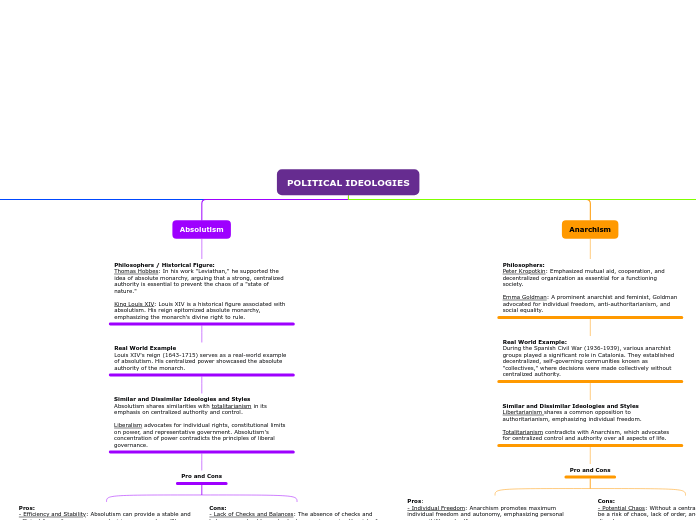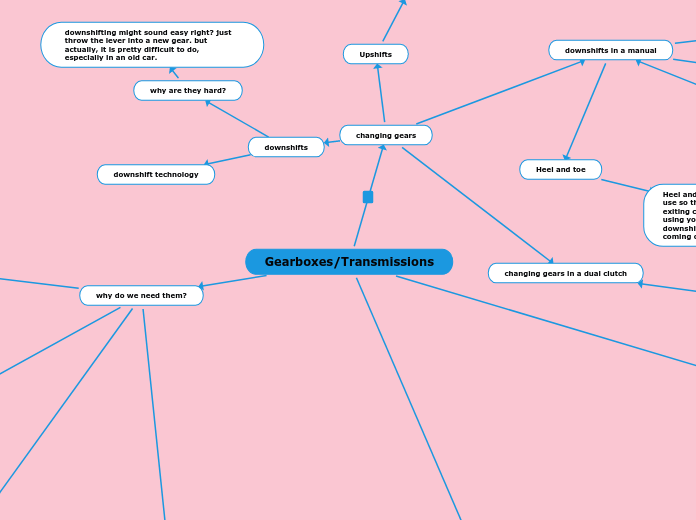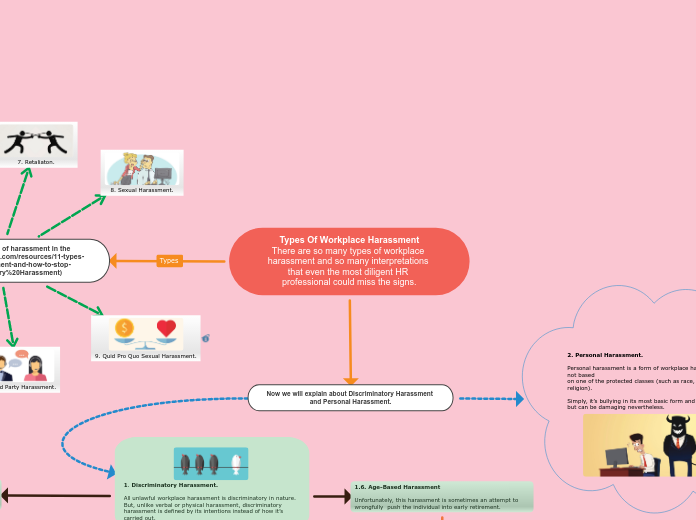POLITICAL STYLES
Utopianism
Philosophers:
Thomas More: Author of "Utopia" (1516), More introduced the term and concept of utopia.
Charles Fourier: A 19th-century French philosopher, Fourier developed detailed plans for utopian communities called phalansteries, promoting social harmony and cooperation.
Real World Example:
Oneida Community (1848-1881): Founded by John Humphrey Noyes, this religious inspired community aimed to create a perfect society through communal living, complex marriage, and a shared economic practices.
Similar and Dissimilar Ideologies and Styles
Socialism: Utopian socialism envisions a ideal society based on cooperation and communal ownership.
Libertarianism: While utopianism and libertarianism both emphasize individual freedom, they differ in their approach to societal organization. Utopianism tends to envision collective well-being, while libertarianism prioritizes individual liberties and limited government intervention.
Cons:
- Impracticality: Can be impractical and unrealistic, often ignoring the complexities of human nature and dynamics.
- Authoritarian Tendencies: Some utopian visions may lead to authoritarian rule, as enforcing a perfect society may require significant control.
- Historical Failures: Many attempts at creating utopian societies in history have faced practical challenges and often resulted in failure.
Pros:
- Inspirational Vision: Provides an inspiring vision of an ideal society, motivating people to strive for a better world.
- Social Harmony: Utopian ideals often promote social harmony, equality, and justice, fostering a sense of community and cooperation.
- Innovation and Progress: Utopian thinking can drive innovation and progress as people seek solutions for achieving an ideal society.
Communitarianism
Philosophers:
Alasdair MacIntyre: Known for his work "After Virtue," MacIntyre is a prominent communitarian thinker who argues for the revival of virtue ethics and the importance of community in moral development.
Michael Sandel: In his book "Liberalism and the Limits of Justice," Sandel critiques the individualistic nature of liberal theories and advocates for a more communitarian approach to justice.
Real World Example:
Kibbutz System in Israel: The kibbutzim, collective communities in Israel, exemplify aspects of communitarianism. Members live and work together, sharing resources and responsibilities for the common good.
Similar and Dissimilar Ideologies and Styles
Socialism shares similarities with Communitarianism in its emphasis on collective responsibility, social justice, and addressing economic inequalities.
Liberalism prioritizes individual rights and autonomy. The emphasis on community over individualism sets these two ideologies apart.
Cons:
- Individual Rights: Communitarianism may sometimes gloss over individual rights to the interests of the community.
- Potential for Conformity: Community norms may pressure individuals to conform to a particular way of life.
- Challenges in Pluralistic Societies: In diverse societies, defining a shared set of values may be challenging, leading to potential conflicts between different cultural groups.
Pros:
- Community Bonds: Communitarianism emphasizes the importance of strong community bonds, fostering a sense of belonging and support among individuals.
- Shared Values: This approach promotes shared values and a common moral framework, contributing to social stability.
Collective Responsibility: It underscores the idea of collective responsibility, encouraging individuals to actively participate in the well-being of the community.
Mohism
Philosophers:
Mozi: Chinese philosopher and the founder of Mohism, contributing significantly to the development of its principles.
Mo Di: Disciple of Mozi and played a crucial role in further developing and systematizing Mohist thought.
Real World Example:
While direct examples of societies fully practicing Mohism are limited, certain aspects of Mohist philosophy, such as promoting universal love and anti-war sentiments, can be found in various social and political movements that advocate for peace, human rights, and humanitarian causes.
Similar and Dissimilar Ideologies and Styles
Utilitarianism: Both focus on the greatest good for the greatest number. Both philosophies emphasize practical benefits and outcomes.
Individualism: Ideologies that prioritize individualism, such as libertarianism or classical liberalism. While Mohism emphasizes the collective good, these individualistic ideologies prioritize personal liberties and limited government intervention.
Cons:
- Narrow Focus on Utility: Mohism's strict adherence to utility may lead to a reductionist view of ethics, overlooking the complexities of moral decision-making.
- Limited Emphasis on Individual Rights: Mohism's strong focus on the collective good may downplay the importance of individual rights and freedoms, raising concerns about personal rights.
- Challenges in Defining Utility: Determining what actions truly maximize benefits can be subjective and challenging, leading to potential ethical dilemmas.
Pros:
- Universal Love: Mohism emphasizes the principle of universal love, advocating for the well-being of all people.
- Utilitarian Ethics: Mohists base their ethical judgments on the principle of utility, seeking actions that bring the greatest overall benefit to society. This utilitarian approach provides a pragmatic foundation for decision-making.
- Meritocratic Governance: Mohism advocates for governance based on merit rather than hereditary privilege. This ensures that individuals with the most competence and capability assume leadership roles.
Confucianism
Philosophers:
Confucius: His teachings form the foundation of the Confucianism, emphasizing ethical conduct, respect for tradition, and the importance of benevolent governance.
Mencius: A disciple of Confucius, further developed Confucian thought. He expanded on the concept of human nature as inherently good, advocating for the moral duty of rulers to promote the well-being of their subjects.
Real World Example:
The influence of Confucian values is evident in South Korean society, where hierarchical structures, respect for elders, and strong family ties are emphasized. Confucian principles have historically influenced education, governance, and social norms in South Korea.
Similar and Dissimilar Ideologies and Styles
Authoritarianism shares some parallels with Confucianism due to its emphasis on hierarchical order, respect for authority, and the potential for limiting individual freedoms. However, Confucianism also emphasizes ethical governance and the ruler's responsibility to serve the best interests of the people.
Individualism contradicts with Confucianism, which prioritizes individual freedoms over societal harmony and hierarchical structures. Confucianism places a greater emphasis on the collective well-being of society.
Cons:
- Gender Inequality: Traditional Confucian values may perpetuate gender roles and inequalities, limiting the roles and opportunities available to women.
- Resistance to Change: Resistant to social and political change, potentially hindering societal progress.
- Authoritarianism: The philosophy's emphasis on authority may be seen as promoting authoritarian governance, limiting democratic principles and individual liberties.
Pros:
- Social Harmony: Confucianism emphasizes the importance of social harmony and ethical conduct, fostering a sense of community and cooperation within society.
- Moral Development: Emphasis on moral development and personal improvement, encouraging people to strive for virtue.
- Ethical Governance: Confucian principles have been applied to governance, promoting ethical leadership and the idea of rulers serving the best interests of the people.
POLITICAL IDEOLOGIES
Paragraph
The various political ideologies and styles I researched showcase a spectrum of approaches to governance, each with its strengths and weaknesses. Liberalism emphasizes individual rights and freedoms, socialism calls for collective ownership and cooperation, conservatism values tradition and stability, anarchism seeks a stateless society, and absolutism emphasizes strong centralized power. Among political styles, nationalism, fascism, and totalitarianism highlight extreme forms of authority, while libertarianism and communitarianism represent divergent views on individual and community rights. Considering the complexities of human nature and the purpose of the state, I believe a balanced and inclusive form of government, incorporating elements of liberalism, communitarianism, and democratic socialism, provides the best approach. This involves protecting individual rights, fostering a sense of community, and addressing socio-economic inequalities through a democratic framework.
Anarchism
Philosophers:
Peter Kropotkin: Emphasized mutual aid, cooperation, and decentralized organization as essential for a functioning society.
Emma Goldman: A prominent anarchist and feminist, Goldman advocated for individual freedom, anti-authoritarianism, and social equality.
Real World Example:
During the Spanish Civil War (1936-1939), various anarchist groups played a significant role in Catalonia. They established decentralized, self-governing communities known as "collectives," where decisions were made collectively without centralized authority.
Similar and Dissimilar Ideologies and Styles Libertarianism shares a common opposition to authoritarianism, emphasizing individual freedom.
Totalitarianism contradicts with Anarchism, which advocates for centralized control and authority over all aspects of life.
Cons:
- Potential Chaos: Without a centralized authority, there may be a risk of chaos, lack of order, and difficulty in resolving disputes.
- Economic Challenges: The absence of a centralized economic system may lead to uncertainties in resource allocation, trade, and economic planning.
- Lack of Accountability: Without a clear structure, ensuring accountability for actions and decisions may be challenging.
Pros:
- Individual Freedom: Anarchism promotes maximum individual freedom and autonomy, emphasizing personal responsibility and self-governance.
- Anti-Authoritarianism: Anarchism opposes oppressive hierarchical structures, advocating for a society without rulers, where power is decentralized.
- Community Cooperation: Anarchism encourages voluntary cooperation and collective decision-making at the local level, fostering a sense of community.
Absolutism
Philosophers / Historical Figure:
Thomas Hobbes: In his work "Leviathan," he supported the idea of absolute monarchy, arguing that a strong, centralized authority is essential to prevent the chaos of a "state of nature."
King Louis XIV: Louis XIV is a historical figure associated with absolutism. His reign epitomized absolute monarchy, emphasizing the monarch's divine right to rule.
Real World Example
Louis XIV's reign (1643-1715) serves as a real-world example of absolutism. His centralized power showcased the absolute authority of the monarch.
Similar and Dissimilar Ideologies and Styles
Absolutism shares similarities with totalitarianism in its emphasis on centralized authority and control.
Liberalism advocates for individual rights, constitutional limits on power, and representative government. Absolutism's concentration of power contradicts the principles of liberal governance.
Cons:
- Lack of Checks and Balances: The absence of checks and balances can lead to unchecked power, increasing the risk of tyranny, corruption, and abuse of authority.
- Limited Representation: Absolutism often marginalizes the voices and needs of diverse groups within the population.
- Resistance and Unrest: Absolute rule can provoke resistance and unrest among the populace, especially when grievances are not addressed or when rulers fail to meet expectations.
Pros:
- Efficiency and Stability: Absolutism can provide a stable and efficient form of governance as decisions are made swiftly without the need for prolonged debates or consensus-building.
- Centralized Authority: A strong central authority can facilitate effective administration, law enforcement, and coordination of resources.
- Reduced Political Instability: Absolutism may reduce internal conflicts and power struggles since the ruler's authority is typically unquestioned, providing a sense of order.
Socialism
Philosophers:
Karl Marx: Often regarded as the father of modern socialism, Marx co-authored "The Communist Manifesto" and laid the theoretical groundwork for socialist and communist ideologies.
Friedrich Engels: Collaborating with Marx, Engels co-authored several works, including "The Condition of the Working Class in England," contributing significantly to socialist theory.
Real World Example:
Sweden combines a market-based economy with extensive social welfare programs. While not strictly socialist, it incorporates socialist principles, such as wealth redistribution and strong social safety nets making it a social democracy.
Similar and Dissimilar Ideologies and Styles:
Marxism is connected to socialism, particularly in its revolutionary form, advocating for the establishment of a classless, stateless society.
Libertarianism emphasizes minimal government intervention, and maximal individual freedoms, and free-market capitalism, it represents the opposite end of the political spectrum.
Pro and Cons
Cons:
- Reduced Incentives: Socialism may reduce incentives to work hard due to the lack of personal financial rewards.
- Potential for Authoritarianism: Socialist regimes have faced criticism for authoritarian practices in their pursuit of socialist ideals.
- Limited Individual Freedom: Socialist systems may limit individual freedom by curbing entrepreneurial pursuit and private property rights.
Pros:
- Economic Equality: Socialism aims to reduce income inequality by redistributing wealth and providing equal opportunities for all members of society.
- Social Welfare: Socialism often leads to comprehensive social welfare programs, including healthcare, education, and unemployment benefits.
Public Ownership: Essential industries and resources are commonly owned by the community, preventing private exploitation for profit.









